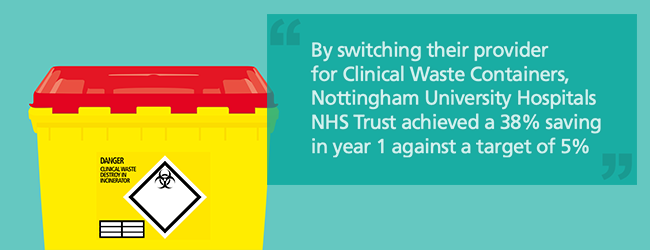Clinical Waste Containers Product Switch: Nottingham University Hospitals NHS Trust

Overview
The procurement department at Nottingham University Hospital NHS Trust were targeted with delivering a 5% saving for the trust. After looking at the infection control equipment portfolio, they identified that the savings potential on clinical waste containers hadn’t been explored for some time, so decided to research the opportunities available if they were to switch to an alternative container provider.
As clinical waste containers are used in every hospital department, there is a requirement for continuous staff training in how to use them correctly alongside ongoing site audits by the supplier. The trust wanted one provider of clinical waste containers across their site for consistency. The challenge was to identify a supplier that could provide a comparable product and support package in order to minimise the impact of the change.
The switch provided us with an equally suitable device but resulted in significant savings. – Clinical Procurement Specialist, Nottingham University Hospitals
Objectives
- Maintain staff and patient safety by keeping the risk of sharps injuries to a minimum.
- Ensure alternative product is compatible with sharps trolleys across all hospital departments.
- Ensure that alternative product sizes are suitable for all hospital departments.
- Achieve 5% savings as a result of the product switch.
Key Project Stakeholders
| Department | Job Title |
| Procurement | Clinical Procurement Specialist |
| Infection Prevention and Control | IPC Matron |
| Health and Safety | Health and Safety Manager |
| Theatres | Theatre Services Manager |
| Phlebotomists | Team Leaders / Supervisors |
| Waste Management | Environmental Services and Sustainable Development Manager |
| High Use Wards | Ward Sister / Charge Nurse |
| Maternity | Practice Development Matron |
| Labs | Pathology General Manager |
The solution
After speaking with providers on NHS Supply Chain’s Clinical Waste Containers Framework Agreement, the trust identified Frontier Medical Ltd as a supplier that was able to offer a suitable product match. However, there was apprehension from key stakeholders who maintained concerns around patient safety and compliance regarding the sharps bins due to the different shapes and sizes used. To alleviate these concerns, the alternative supplier facilitated the following:
- Presentation days (where detailed product information was provided to the trust).
- Q&A sessions (where staff questions were addressed directly in an open forum).
- Training days (where differences in product usage was explained and demonstrated).
- Supplier site visits (where staff could attend and see where and how the product is made).
The support we received from the company was fantastic, making the implementation run with ease. The suppliers had a team of staff on site throughout the implementation period to undertake site surveys, change all the waste containers and provide support and education to all areas. This was followed up by further educational support attending study days, visiting clinical areas and generally having a high profile within the trust. – Infection Prevention and Control Matron, Nottingham University Hospitals
Process undertaken
Following this activity, the trust agreed to progress with the alternative supplier on a trial basis and a process was developed which included the following:
- Supplier – Conducts product trials in the following departments:
Micro, Anon, Dialysis, BRU, Phlebotomy, Caridac Theatres, Emergency Theatres, Trauma Theatres, Clinical Chem, CT Department, Clinical Path and Blood Bank. - Procurement
Holds meeting to review trial outcomes with the Health and Safety Board. - Procurement
Conducts final review with the Health and Safety Board and Infection Control department to review commercials of the agreement - Supplier – Works with trust to create an Implementation Plan which included:
Site Audits
Training and Installation
Key Achievements
- Direct Supplier Account Management support was provided throughout the process.
- The trust overachieved against their target saving of 5% achieving a 38% saving in year one as a result of the switch.
- The supplier supported the delivery of savings by ensuring that the containers being used were the correct size and waste stream for each department and not above the required specification. This was reviewed after the first 6 months in order to ensure an optimal product utilisation.
- The supplier had the same team on site for audits and implementation which provided a smooth transition as they knew exactly where the products were across the hospital departments.
- Training was provided throughout the transition process to minimise the impact of the change.
- The supplier provided additional support by replacing all container brackets and accessories.
- No complaints or incidents with the product were reported.
- A plan of action was developed to address any issues raised at audit so that they could be resolved quickly and efficiently.
The Results
- Identify and engage with all key stakeholders / departments that will be impacted by the product switch prior to going to trial. This will make implementation quicker and negate the need to run further trials at a later stage.
- Set up a meeting with the alternative supplier(s) and key stakeholders prior to going to trial so that any concerns can be addressed up front. This will help to obtain buy in.
- Once identified, work closely with the impacted hospital departments to ensure that any feedback noted at trial is considered and, where necessary, addressed during implementation.
- Leverage the supplier’s expertise on the correct waste streams to save money in incineration costs.
- Utilise the supplier’s advice regarding the appropriate container sizes needed.
- Periodically review the supplier(s) used for clinical waste containers to determine whether they continue to offer best value.
Next Steps
See our Downloads ▼ section if you would prefer to have a more printable, PDF version of this case study.
If you are interested in changing your current provider, please contact your NHS Supply Chain Account Manager.
For any queries relating to this Case Study and details within, please contact:
